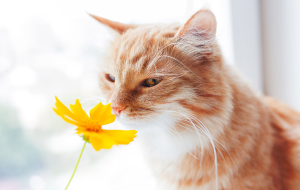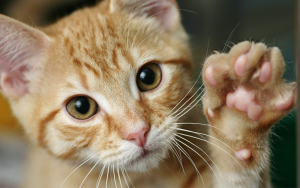Why Do Cats Knock Things Over? Understanding This Feline Behavior

Cats are fascinating creatures with curious habits that often leave their human companions scratching their heads. One of the most perplexing (and sometimes frustrating) behaviors is their tendency to knock things over. Whether it’s a glass of water,
a pen, or a decorative trinket, no object on a tabletop seems safe from a cat’s paw. But why do they do it? Is it mischief, instinct, or something else entirely?
In this comprehensive article, we will explore the reasons behind this quirky behavior, offering insights into feline psychology and tips for managing your cat’s urge to topple objects.
The Instinctive Roots of Cat Behavior
Cats are natural hunters, and their behaviors are deeply rooted in survival instincts. Even domesticated cats retain many of the traits that helped their ancestors thrive in the wild. Knocking objects over might not seem like hunting behavior at first
glance, but it serves several instinctual purposes:
1. Testing Objects as Prey
When a cat swats at an item, it mimics the action of testing potential prey. Wild cats often tap or nudge small creatures to assess whether they’re alive, injured, or safe to approach. A pen rolling across the desk might trigger this hunting instinct.
2. Exploring Their Environment
Cats are naturally curious and use their paws to investigate their surroundings. By knocking something over, they gather information about the object’s texture, weight, and movement. For a cat, it’s less about causing chaos and more about satisfying their
curiosity.
3. Practicing Hunting Skills
Even if your cat is well-fed and has never had to hunt for food, they still have an innate drive to practice hunting behaviors. Swatting at and knocking over objects can be a way for cats to keep their skills sharp.
Attention-Seeking Behavior
Cats are clever animals, and they quickly learn how to get their human’s attention. If you’ve ever rushed over to stop your cat from knocking over a glass or scolded them after they’ve pushed a plant off a table, you may have inadvertently reinforced
the behavior.
4. Cause and Effect
Cats are excellent at observing and understanding cause and effect. When they knock something over and you react, they realize their actions have a direct impact on their environment. If they’re feeling ignored, this can become a surefire way to get noticed.
5. Boredom or Lack of Stimulation
If your cat is knocking over items frequently, they might be trying to tell you they’re bored. A lack of mental and physical stimulation can lead cats to engage in attention-grabbing behaviors.
Cats and Territory
Territorial instincts can also play a role in this behavior. Cats have scent glands in their paws, and when they touch or swat objects, they’re marking their territory. Knocking things over could be a way for them to assert dominance or establish ownership
of their space.
Tips to Minimize the Behavior
Understanding why your cat knocks things over is the first step toward addressing the issue. Here are practical ways to reduce or redirect this behavior:
1. Provide Enrichment
Keep your cat entertained with toys, scratching posts, and climbing trees. Puzzle feeders and interactive toys can also engage their hunting instincts in a controlled way.
2. Offer Alternatives
If your cat seems to enjoy swatting at objects, give them safe alternatives. Lightweight balls, dangling toys, or even crumpled paper can satisfy their urge to bat at things.
3. Make Surfaces Less Appealing
Remove or secure fragile items from areas your cat frequents. Use double-sided tape or sticky pads on surfaces where they tend to climb, as cats dislike the sensation on their paws.
4. Increase Playtime
Spend more time playing with your cat to burn off excess energy. Wand toys and laser pointers are excellent for mimicking prey-like movements.
5. Avoid Reinforcing the Behavior
If your cat knocks something over, try not to react with anger or excessive attention. Instead, calmly remove the item and redirect their focus to a toy or scratching post.
When to Worry
While knocking things over is usually harmless, it can sometimes indicate underlying issues. If your cat’s behavior is accompanied by other changes, such as a loss of appetite, lethargy, or aggression, consult your veterinarian. These could be signs of
stress, anxiety, or a medical condition.
Conclusion
Cats knock things over for a variety of reasons, ranging from instinctual behaviors to seeking attention. By understanding the root causes and providing appropriate outlets for their energy and curiosity, you can minimize the behavior while strengthening
your bond with your feline friend.
Remember, cats are complex creatures, and their quirks are part of what makes them so endearing. Embrace their playful nature and channel it in ways that keep both your home and your furry companion safe and happy.
By addressing their needs and providing a stimulating environment, you can help your cat thrive while keeping your precious belongings intact.
FAQs About Cats Knocking Things Over
1. Is it normal for cats to knock things over?
Yes, this behavior is entirely normal and rooted in a combination of instinct and curiosity.
2. How can I stop my cat from knocking over water glasses?
Switch to heavier, spill-proof bowls or cups, and place them in areas your cat can’t easily access.
3. Does knocking things over mean my cat is unhappy?
Not necessarily. While it can sometimes signal boredom or frustration, it’s often just a way for cats to explore their environment or get your attention.
4. Why do cats knock things over at night?
Cats are crepuscular, meaning they’re most active at dawn and dusk. Nighttime antics may simply be a result of their natural energy patterns.
5. Are some cat breeds more prone to this behavior?
Active and curious breeds, such as Bengals, Siamese, and Abyssinians, may be more likely to knock things over due to their playful and inquisitive nature.







